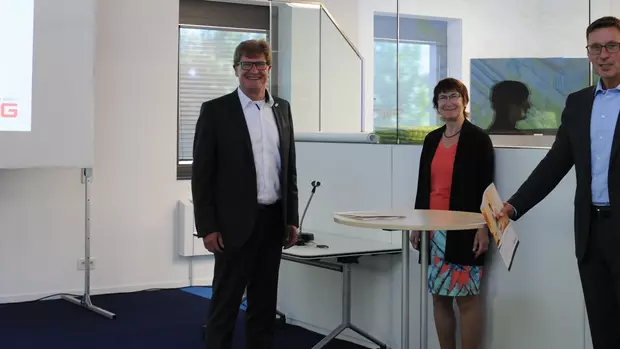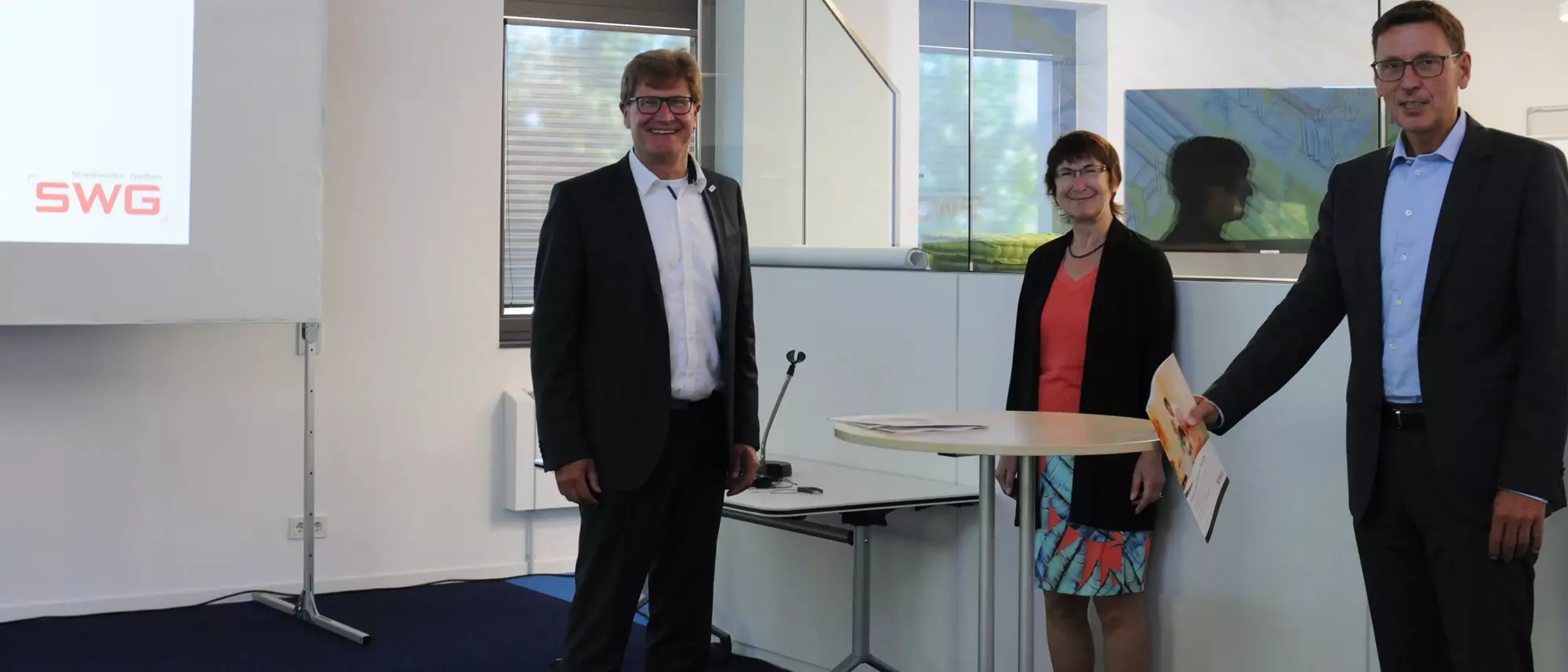
Special effects allow Stadtwerke Gießen to look back on a successful year. At the annual press conference on 24 June, those responsible were able to present pleasing figures. They also provided an insight into the current financial year.
Two key issues continue to dominate the German utility industry: the energy transition, which is increasingly gaining momentum, and the ever faster pace of digitalisation pose real challenges for energy suppliers such as Stadtwerke Gießen (SWG). Astrid Eibelshäuser, Chairwoman of the SWG Supervisory Board, Matthias Funk, Chief Technical Officer, and Jens Schmidt, Chief Commercial Officer, demonstrated how well the company is coping with these challenges when they presented the latest business figures at this year's annual press conference. In 2019, SWG generated a profit of around 9 million euros. The owner, the city of Giessen, will receive a distribution of 2.5 million euros. "The already good result has another special aspect. For every euro that SWG earns, 29 cents stays in the region," explains Astrid Eibelshäuser. "This fact underlines the good work of the municipal utilities."
In addition to the sales successes induced by the ongoing construction boom - especially outside the traditional supply area - the increase in profits is not only due to optimised internal processes, but also mainly to special effects such as income from an EEG back payment from 2018 and the sale of shareholdings. "We have taken a very close look at our own efficiency in recent years and have made many noticeable improvements in this area. We are now reaping the rewards of this work," summarises Jens Schmidt.
Against the backdrop of the coronavirus crisis, the extremely positive company result comes at just the right time. After all, no one can yet seriously estimate the economic consequences of the pandemic - neither nationwide nor limited to SWG. "We are really pleased that we have been able to build up adequate reserves for the coming months and years," says Jens Schmidt, summarising the situation.
Round anniversaries and important milestones
SWG celebrated two milestone anniversaries in 2019: Both local public transport and the waterworks in Queckborn celebrated their 125th anniversary. Both celebrations were well attended and were well received by customers. A lot of interesting information was provided during the visits to the bus workshop and the tour of the waterworks.
Of course, SWG also did a lot in 2019 to promote sustainability and the efficient use of energy. For example, all buses operated by SWG subsidiary MIT.BUS have been running on bio natural gas since March 2019 - making them virtually CO2-neutral. "We started gradually converting the fleet to natural gas years ago. The decision to switch to bio natural gas as a fuel when we replaced the last three diesel vehicles was only logical," says Matthias Funk.
SWG has also taken a similar path in terms of heat generation and took an important step in 2019 with the inauguration of TREA 2. As in TREA 1, which has already been operating successfully for many years, high-calorific waste is also used as fuel in the new plant. The decisive further development of TREA 2 is that it not only generates heat, but also electricity. This is because the SWG engineers have combined waste incineration with efficient combined heat and power plants in this system, which is probably the only one of its kind in the world. "This not only ensures better utilisation of the primary energy used, but also makes the TREA 2 extremely flexible," says Matthias Funk.
51 e-cars for the region
SWG also made some progress in the field of e-mobility in 2019. However, the E-Revolution product world is deliberately not just about this topic. "If you want to help e-vehicles achieve a breakthrough, we believe you always have to think about charging at the same time," says Ina Weller, company spokesperson for the municipal utility, explaining the idea behind the e-revolution. Consequently, the offer not only includes an e-car at unrivalled conditions, but also the options of buying or renting wallboxes, photovoltaic systems and electricity storage units. This holistic approach is well received by customers. In 2019 alone, SWG managed to put 51 Smart EQ Fortwo cars on the roads in the region. In 2019, 200 e-cars were registered in the administrative district of Giessen. This means that SWG is responsible for 25 per cent of the increase. SWG contributed more than ten per cent of the total of 448 vehicles in January 2020. "Of course we are delighted with these figures. But the demand for the other modules from the e-revolution also shows us that we are on the right track with our product," adds Matthias Funk, "and in addition to the joy of this growth, there is also the joy that we have been able to do a lot to protect the climate."
A lot has already happened
In 2020, the COVID-19 pandemic became an overarching issue that affected practically all areas of life. Nevertheless, SWG made decisive progress in the first few months of this year and finalised a major project: so-called H-gas has been flowing through the natural gas pipelines since mid-April. Unlike all other network operators, the SWG subsidiary Mittelhessen Netz managed this project on its own instead of hiring the nationwide teams of tradesmen organised by the federal association. "An enormous effort, but in the end the decision was exactly right," Matthias Funk is convinced. And his colleague Jens Schmidt adds: "Because we worked with local specialist companies, we were able to keep a large part of the added value in the region."
With such a logistically complex and extensive project - around 35,000 natural gas appliances had to be adapted to the higher calorific value - minor problems can naturally not be completely ruled out. But SWG's approach was also convincing in this respect. The in-house project management team kept information channels short and usually found a solution quickly.
Cooperation with universities also continued in 2020. Scientists at the Technical University of Central Hesse (THM) are currently researching whether and how energy self-sufficient neighbourhoods can be built. The "Flexquartier", in which two different electricity storage technologies are used, is being built on the former motor pool site. SWG is using its expertise to integrate these two central components. In the case of the high-temperature storage system, this means that more than just electricity connections are required. "We recover some of the stored energy as heat," explains Matthias Funk. And it is precisely this heat that requires a network to transport it to the various flats in the new neighbourhood. "Basically, the aim of the study is to find out how innovative technology from research can be transferred into practice," continues Matthias Funk.
The basis for the energy transition
The SWG subsidiary smartSTADTwerke is working flat out on two key projects in 2020: The rollout of so-called smart meters will begin this year. These intelligent meters are an essential building block for the energy transition. This is because they make it possible to better harmonise generation and consumption and thus significantly mitigate the weather-related volatility of wind and solar power production. The second project focuses on the topic of e-mobility. Here, the experts are working on the development of a charging network. "Nine regional energy suppliers are now cooperating under the umbrella of smartSTADTwerke. The introduction of smart meters and the charging network for electric cars are ideal examples of how companies can work together to tackle complex issues, leverage synergies and thus reduce costs," explains Jens Schmidt.
Hard facts for better decisions
Another research project, for which SWG is even receiving funding from the federal government, aims to significantly improve local transport services: SWG and MIT.BUS are working on a system that visualises passenger numbers on the buses in real time and links them to many other important parameters. This will soon make it possible to optimise timetables - both in terms of comfort and efficiency. After all, if you know exactly how many people are using a particular bus and when, you can develop a timetable that is precisely tailored to this. "That's exactly what we want to achieve," says Matthias Funk, explaining the company's commitment. Because many sensors already provide important data, the transport planners at SWG and MIT.BUS have already benefited from the first big data application in the municipal utilities group. When passenger numbers fell rapidly in mid-March due to the coronavirus, those responsible were able to make the right decisions based on hard facts.
Keyword Corona
As a reliable, customer-focused energy service provider, provider of local transport and operator of public swimming pools, SWG was and is naturally massively affected by the impact of the SARS-CoV-2 virus. However, unlike other companies, there was never any question of SWG temporarily closing down. "A municipal utility has to function," says Matthias Funk. "That's why we reacted immediately and did everything necessary to ensure a secure supply," adds Jens Schmidt. In fact, crisis management is a top priority at SWG. Under the leadership of the two board members, the crisis team made the necessary decisions, initially on a daily basis and later at longer intervals. One of the first measures was to split the network control centre into two locations and separate the teams. "This enabled us to significantly reduce the risk of infection among employees and ensure our ability to act," says Jens Schmidt, explaining the move. Wherever possible, employees moved to home offices and are working from home until further notice. "It goes without saying that we fulfil the COVID-19 standard in terms of occupational health and safety," says Matthias Funk. This is evidenced by a seal that is publicly displayed in the foyer of the head office.
Of course, the pandemic led to massive restrictions in certain areas. They forced SWG to apply for short-time working in the affected areas. Initially, there were no more tickets on the buses. With the closure of schools, the Saturday timetable also applied from Monday to Friday. Ultimately, the swimming pools, the customer centre on Marktplatz including the mobility centre and, a little later, the contact point for customers in Lahnstraße closed. Stadtwerke also cancelled all planned events - such as the SWG Cup. "We would like to take this opportunity to thank all our customers. For their understanding and for their prudent behaviour," explains Jens Schmidt.
Looking ahead
The two board members found it much more difficult than in previous years to present concrete plans for the future. Not because there are none, but because corona will continue to have an impact for a long time to come. And what this means economically for Stadtwerke Gießen is unlikely to become clear until the autumn at the earliest. The fact is that, like many other energy suppliers, SWG is stuck with quantities that have already been ordered because industry and commerce have not purchased electricity and natural gas as forecast due to the lockdown. Added to this is the loss of revenue from local transport and public swimming pools.
Despite all these uncertainties, Stadtwerke Gießen is staying on course. The aim is to consistently develop SWG further, improve structures and processes, train employees and drive forward climate protection with the help of efficiency improvements and innovative technologies. Jens Schmidt puts it this way: "The company is in a rock-solid position. Not only in economic terms, but also in terms of the expertise and experience of the workforce. We firmly believe that SWG will emerge from the crisis in good shape and will be able to return to the energy market, local transport and swimming pools with its usual vigour relatively quickly."
In conclusion, Matthias Funk thanked the Board of Directors for their extremely committed and responsible cooperation over the past period. Both were convinced that the SWG employees form the foundation for a successful future for the company.

